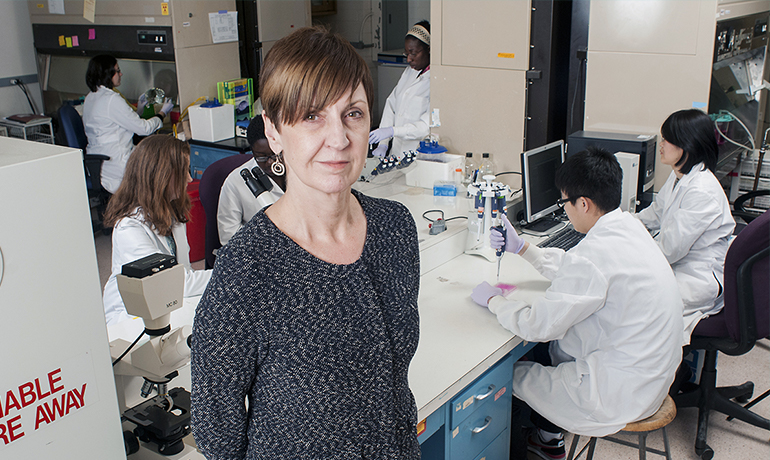
Breast cancer robbed Judy Bolton of finding a cure for the disease.
 Bolton, PhD, a University of Illinois Cancer Center member, distinguished professor and head of the department of medicinal chemistry and pharmacognosy in the UIC College of Pharmacy, died Tuesday, March 5, from complications of breast cancer. A memorial service attended by more than 200 people was held at the College of Pharmacy yesterday to celebrate Bolton’s life. It was also streamed live on Facebook and broadcast to the college’s Rockford campus.
Bolton, PhD, a University of Illinois Cancer Center member, distinguished professor and head of the department of medicinal chemistry and pharmacognosy in the UIC College of Pharmacy, died Tuesday, March 5, from complications of breast cancer. A memorial service attended by more than 200 people was held at the College of Pharmacy yesterday to celebrate Bolton’s life. It was also streamed live on Facebook and broadcast to the college’s Rockford campus.
Born in Cambridge, UK, on Aug. 14, 1962, Bolton was raised in London, Ontario, Canada. She received her bachelor’s of science and doctoral degree from the University of Toronto. Following completion of a postdoctoral fellowship at the University of Colorado she returned to Ontario in 1992, where she became a faculty member at Queen’s University in Kingston, Ontario, Canada.
While at Queen’s, Bolton discovered that estrogens formed catechols and quinones – compounds that can form damaging DNA adducts and initiate cancer-causing mutations – naturally in the body. Two years later she joined the faculty in the UIC College of Pharmacy as an assistant professor. She became head of the department of medicinal chemistry and pharmacognosy in 2005.
In 1999, Bolton, a renowned toxicologist, was among a group of UIC researchers that formed the UIC/NIH Botanical Dietary Supplements Center on women’s health. The Center, she told Chemical & Engineering News last year, was “interested in botanicals that women were taking as natural alternatives to menopause hormone therapies and how these botanicals interfered with the chemical carcinogenic pathway that involves estrogen in a beneficial way.”
Bolton led an experienced chemical toxicology research team that is primarily focused on post-menopausal women’s health. The group was conducting research on why women who are taking hormone replacement therapy or selective estrogen receptor modulators (SERMs) are at increased risk for developing hormone dependent cancers such as breast or endometrial cancers. The center is focused on determining whether dietary supplements (red clover, black cohosh, dong quai) with claims of hot flash relief have any efficacy, toxicity, or chemopreventive effects.
Hops is another botanical dietary supplement which has become popular among women with postmenopausal symptoms, as they are perceived as a safer alternative to hormone therapy. Bolton and her colleagues discovered that an enriched hops extract – 6-prenylnarigenin, or 6-PN – increased a detoxification pathway in the cells that has been linked to a lower risk for breast cancer.
Throughout her career, Bolton won numerous awards, including UIC Woman of the Year in 2013 and the Founder’s Award from the American Chemical Society.
Glen Schumock, PharmD, PhD, MBA, professor and dean of the College of Pharmacy, told those in attendance that Bolton was a respected scientist who guided the department of medicinal chemistry and pharmacognosy through a “period of tremendous growth and success.”
“Judy was extremely dedicated to her work, and devoted to her scientific family, as well as the UIC College of Pharmacy. She very much enjoyed her role as department head. She didn’t need to tell me, it showed on her face. Nothing stopped her, not even cancer.”
Joanna Burdette, PhD, UI Cancer Center member and professor of medicinal chemistry and pharmacognosy, said Bolton was not only a mentor, but a “dear friend. She was an accomplished scientific scholar, she was fearless, she had intuitive marksmanship and decisiveness, was protective, honest, hilarious, tough and generous. She was also loyal.
“Judy loved UIC,” Burdette said. “Part of the reason she was able to recruit so many talented people into this department was because she truly believed in the mission of UIC. She was here almost her entire professional career. Although she had many opportunities to leave, she always found a reason to stay at UIC and to dedicate herself to the community here.”
Former College of Pharmacy Dean Jerry Bauman, PharmD, said he “knew this day would come but I thought Judy was indestructible. When she became ill I never heard her complain. This college will miss her.”
